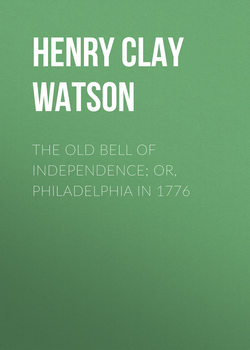Читать книгу The Old Bell of Independence; Or, Philadelphia in 1776 - Henry Clay Watson - Страница 6
STORY OF THE PRAYER
Оглавление"There is only one other scene during the struggle for our country's right," said young Harmar, "which I would compare with the one I have just narrated; and that is the scene in Congress—the old Continental Congress—during the first prayer by the Rev. Mr. Duche."
"I've heard something of that prayer," said Morton, "since the Revolution, but nothing that I could depend on."
"An account of the scene is given by John Adams, who was a chief actor in it," said young Harmar.
"Old John Adams?" enquired Higgins. "He was the man! He was the Washington of our politics during the war. He was the man!" and Higgins rubbed his hands together.
"Thomas Jefferson, take your foot off your brother's, and quit pinching him," interrupted Mrs. Harmar.
"I have Mr. Adams' account of that first prayer and its effects," said young Harmar, "and here it is." So saying, he pulled from his pocket a paper into which the account had been copied, and read:—
"'When the Congress met, Mr. Gushing made a motion that it should be opened with prayer. It was opposed by Mr. Jay, of New York, and Mr. Rutledge, of South Carolina, because we were so divided in our religious sentiments, some Episcopalians, some Quakers, some Anabaptists, some Presbyterians, and some Congregationalists, that we could not join in the same act of worship. Mr. Samuel Adams arose and said, 'that he was no bigot, and could hear a prayer from any gentleman of piety, and who was, at the same time, a friend of his country. He was a stranger in Philadelphia, but had heard that Mr. Duche (Dushay they pronounced it) deserved that character, and therefore he moved that Mr. Duche, an Episcopal clergyman, might be desired to read prayers to the Congress to-morrow morning.' The motion was seconded, and passed in the affirmative.—Mr. Randolph, our President, waited on Mr. Duche, and received for answer, that if his health would permit he certainly would. Accordingly, next morning he appeared with his clerk, and, in his pontificals, read several prayers in the established form, and then read the collect for the seventh day of September, which was the thirty-fifth psalm. You must remember, this was the next morning after we had heard the rumor of the horrible cannonade of Boston. It seemed as if Heaven had ordained that psalm to be read on that morning.
"'After this, Mr. Duche, unexpectedly to every body, struck out into an extemporary prayer which filled the bosom of every man present. I must confess I never heard a better prayer, or one so well pronounced. Episcopalian as he is, Dr. Cooper himself never prayed with such fervor, such correctness and pathos, and in language so elegant and sublime, for America, for Congress, for the province of Massachusetts Bay, especially the town of Boston. It has had an excellent effect upon every body here. I must beg you to read that psalm. If there is any faith in the sortes Virgilianæ, or sortes Homericæ, or especially the sortes Biblicæ, it would be thought providential.'
"The thirty-fifth psalm was indeed appropriate to the news received, and the exigencies of the times. It commences:—
"'Plead my cause, O Lord, with them that fight against me.
'Take hold of shield and buckler, and stand up for my help.
'Draw out also the spear, and stop the way against them that persecute me: say unto my soul, I am thy salvation.'
"What a subject for contemplation does this picture present. The forty-four members of the first Congress, in their Hall, all bent before the mercy-seat, and asking Him that their enemies 'might be as chaff before the wind.' WASHINGTON was kneeling there; and Henry and Randolph, and Rutledge, and Lee, and Jay; and by their side there stood, bowed in reverence, the Puritan patriots of New England, who, at that moment, had reason to believe that an armed soldiery was wasting their humble households. It was believed that Boston had been bombarded and destroyed. They prayed fervently 'for America, for the Congress, for the province of Massachusetts Bay, and especially for the town of Boston;' and who can realize the emotion with which they turned imploringly to Heaven for divine interposition and aid? 'It was enough to melt a heart of stone. I saw the tears gush into the eyes of the old, grave Quakers of Philadelphia.'"
"Yes," said Wilson, when young Harmar had concluded, "that was a scene equal, at least, to the one on the eve of Brandywine: how finely old John Adams speaks about it!"
"That Dr. Duche forgot his connexion with the Church of England, and only thought of his country," remarked Morton. "He was a good man."
"Yes; and he prayed in the presence of as good a set of men as was ever assembled together," added Smith. "Them was men—those Congressmen. They didn't get eight dollars a day for making speeches."
"No," put in Higgins, "but they earned a great deal more. Some of 'em lost all the property they had, during the war."
"The spirit which animated our countrymen at that period was the noblest which could prompt the deeds of men," said young Harmar, growing quite eloquent. "From the men who emptied the tea into Boston harbor, to the statesman of the Continental Congress, all were filled with patriotism, and that's the most unselfish of human motives."
